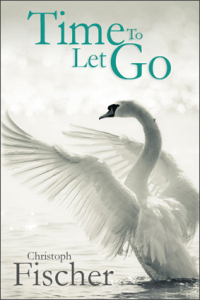P.C. Zick's Blog, page 32
July 11, 2014
Book Review Friday – Go Away Home
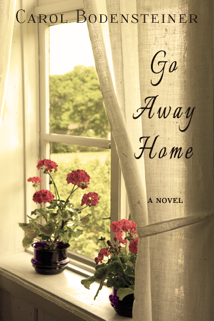
Click for Kindle version
In an Author Wednesday interview with author Carol Brodensteiner, I asked her the best thing someone could say about her novel Go Away Home. She said, “I think the best thing someone could tell me is that they were touched by the characters and the story. That would mean they felt the story was well told, which was my goal in the first place. The second best thing is that they came away from the book knowing more about life in the early twentieth century.”
Go Away Home, Ms. Brodensteiner’s first novel, scores on both counts. The story touched me, and I learned a few things in the process.
The main character, Liddie, yearns for a life outside of her family’s Iowa farm as the novel opens in 1914. She’s sixteen and has yet to deal with life’s harsh realities. The novel’s coming of age theme isn’t old-fashioned despite its historical setting. The same universal characteristics apply whether a novel is set in the 1900s or 2000s. Liddie must come to terms with the world, not as black and white, but as shades of gray. It’s the same for everyone. Those who adapt can enjoy fulfilling lives no matter the circumstances.
I particularly enjoyed one of the messages in Go Away Home. If offers the encouragement to keep doing something no matter how dire life may seem. We can sit and do nothing, but if we do there’s no hope for anything miraculous to occur. Liddie must keep moving and doing things even when the most precious things in life have been taken from her. If she sits and does nothing, that’s exactly what will happen. I loved Liddie and her determination. Yet, Ms. Brodensteiner created a very real character in this woman. In one particular scene, Liddie has made a dire mistake with a lovely dress made for a client of the dress shop where she works. She prays no one will notice, but of course, the owner of the shop does. Liddie’s horror, fear, hope, and embarrassment are the emotions we all share in the same type of circumstances. It’s a brilliant piece of writing and characterization.
The novel’s setting of eastern rural Iowa during the years 1914 – 1919 sets the tone for Go Away Home. First, the farming life creates a tableau of innocence and simple pleasures. Fresh baked bread, gooey chocolate cake, cows bearing calves, and shirts sewn with fanciful embroidery seem romantic to us living in the twenty-first century. However, to Liddie and her family those were the everyday occurrences on the farm. The world of wars and suffragists intrudes into the drum beat of everyday living. Letter writing brings news of family far away, but with great gaps in time. This simple way of life confines Liddie—or so she thinks—until she goes out into the world and discovers that life in the city isn’t as satisfying as she thought. The sister who must leave home in shame when she becomes pregnant without the benefit of wedlock affects the entire family. It seems so silly now, but then it was considered the worst thing that could happen—until the worst thing does happen and then priorities must be rearranged.
Liddie hopes that women’s suffrage will bring freedom for her to choose how she wants to live her life. The draft at the beginning of the United States’ entry into World War I creates fear among the family, although no one close to them is drafted. Automobiles are beginning to appear, even on the farm. And the telephone is a novelty, but one that soon proves to be invaluable.
We believe that technologies are changing at a rapid speed now. Imagine what it must have been like to suddenly go from horse-powered transportation to a machine filled with gasoline. Or what it meant to suddenly be connected to someone living hours away through the black device on the wall. We have no idea what it must have been like in those days of discovery and invention. However, through novels such as Go Away Home, we learn about those times and how it must have been for our ancestors.
The research is impeccable in this novel. Ms. Brodensteiner has proven herself as an exceptional storyteller in her first novel. If you enjoy rich characters and historical fiction, you won’t be disappointed in Go Away Home.
Disclosure: I was provided with an Advanced Review copy of Go Away Home in exchange for an honest review.


#New Release – Murderous Lies by Chantel Rhondeau

Title: Murderous Lies
Released: July 11, 2014
Author: Chantel Rhondeau
Genre: Romantic
Suspense/Murder Mystery
Length: 61,000 words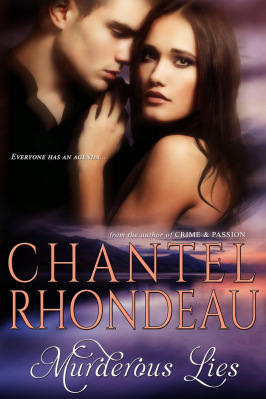
Imprisoned for murders he
didn’t commit, Max Kensington is exonerated after eight years when a new
witness steps forward. He returns to his hometown and no one’s happy to see him,
least of all his ex-fiancée, Rosemary Spelling.
Max’s return forces Rose to
confront her feelings about the past. The day he killed her sister ruined Rose’s
life, destroying her family and landing her mother in a mental institution.
When someone leaves a bloody
threat on Rose’s porch, the police jump to conclusions, assuming Max is after
revenge. Rose isn’t so sure. She begins questioning Max’s guilt, wondering if someone
is trying to cover up what really happened to her sister.
All Max wants is his life
back and a chance to regain Rose’s love. To get that, he has to catch the
killer. His obsessive need for justice drives his actions, but the murderer
seems a step ahead. When new bodies surface, evidence points to Max as the
culprit. Now he could lose everything when the killer zeroes in on a new target…Rose.
Content Warning: Language,
Violence, and Sizzling Love Scenes
“Exciting cat-and-mouse mystery full of surprising twists and scorching second chances.” ~ Rachelle Ayala – Romantic Suspense Author
Read the
first two chapters: http://bit.ly/1p780vQ
On Sale for only 99 cents for two weeks only! Buy it Now!
Amazon Kindle: http://amzn.to/1nisHlm
KOBO: http://bit.ly/1i32rym
Barnes & Noble: http://bit.ly/1p786Uq
Apple iBooks: http://bit.ly/UEU9SR
All Romance eReads: http://bit.ly/1qZf11n
Smashwords: http://bit.ly/1qngtgs
Add to
Goodreads: http://bit.ly/SMFGlS
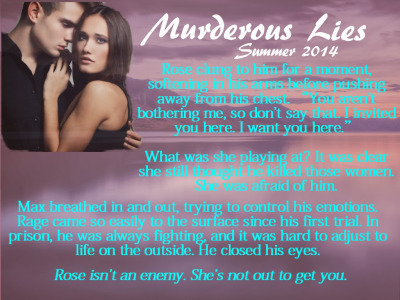
Author Bio
 Chantel once thought a great mystery or fantasy book with strong
Chantel once thought a great mystery or fantasy book with strongromantic themes was the highest level of reading bliss. After reading her first
romantic suspense novel, she never looked back. Before long, the need to create
her own stories took over. She spend her days in the clinical profession of
medical transcriptionist, but her passion is in the hours spent with her
characters in the evenings.
She live in the western United States, and when she’s not writing
she love playing cards with her family, bowling on leagues, and snuggling with
her lazy kitties.
Want to contact Chantel?
Website: http://www.chantelrhondeau.com
Cyber Stalk on Facebook https://www.facebook.com/ChantelRhondeau
Follow on Twitter https://twitter.com/ChantelRhondeau
Check out all Chantel’s available titles: http://www.chantelrhondeau.com/p/my-available-titles.html


July 9, 2014
Author Wednesday – Carol Bodensteiner
 Welcome to Author Wednesday. Today I’m pleased to introduce you to Carol Bodensteiner. Carol released her first novel, Go Away Home, this past month, and she’s stopped by to talk a little bit about writing this World War I-era novel set in rural eastern Iowa. Her first book, Growing Up Country, is a memoir of growing up in Iowa in the 1950s. It’s so nice to have you visit today, Carol. Congratulations on publishing your first novel. Tell us about Go Away Home.
Welcome to Author Wednesday. Today I’m pleased to introduce you to Carol Bodensteiner. Carol released her first novel, Go Away Home, this past month, and she’s stopped by to talk a little bit about writing this World War I-era novel set in rural eastern Iowa. Her first book, Growing Up Country, is a memoir of growing up in Iowa in the 1950s. It’s so nice to have you visit today, Carol. Congratulations on publishing your first novel. Tell us about Go Away Home.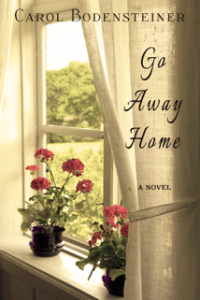 What’s the one sentence pitch for this work of historical fiction?
What’s the one sentence pitch for this work of historical fiction?
Thanks for inviting me to Author Wednesday, P.C. Go Away Home is the story of a young woman’s quest for independence and the right to decide her own future set against a twentieth century backdrop when options for women were limited yet social change was occurring and the Great War was on the horizon.
What is the main message you wanted to convey in this novel?
Go Away Home explores the reality that life is not as simple, or the choices as clear-cut, as we often hope they are, and that when confronted with the conflict between dreams and reality we learn there are tradeoffs. To get one thing, we often must give up something equally important.
We don’t really grow up until we’re confronted with those gray areas in life. This lesson is an important one to address. Tell us how you came up with the idea for Go Away Home.
Ever since I was a small child and learned that my grandfather died of the Spanish flu in 1918, I’ve been fascinated by my connection to that major world event. In a way my novel creates a life for the man I never knew and for the grandmother I only knew as a stern old woman. Since I never asked my grandmother a single question about my grandfather and their lives together, the story is entirely fiction.
I did that in my last novel with my grandfather. It was a way for me to create the grandfather I wanted. I’m glad you were able to do this in your fiction as well. Since this is set one hundred years ago, what type of research did you do?
My research covered everything from photo studios, clothing, apprenticeships, boarding houses, electricity and telephones, to attitudes toward German immigrants during World War I. I roamed the Living History Farms, the State Historical Society Library, and the stacks at the public library. I spent hours with an uncle who grew up on a farm pre-electricity and with a high school classmate whose family owns a rural telephone company. I found on-line issues of Kodak magazines for photographers and YouTube videos about driving a Model T. I couldn’t have dreamed up things half as interesting as the reality I found through my research.
I was impressed with the wide range of issues you tackled in Go Away Home. I think it’s very interesting that YouTube helped you learn about the Model T. I know that both of your books are set in the same place in Iowa. What role does setting play in your novel?
Setting is critical to the story, representing one of the basic choices my main character Liddie faces. She grows up on a farm and though she wants desperately to get to the city with all the excitement and opportunities that represents, her connection to the farm and the kind of life she had there is stronger than she realizes.
I feel a strong connection to place myself and find conveying place is important to my writing. In addition to the larger “city vs. country” settings, there are smaller places very important to the story. Some readers have commented that the grove, which Liddie retreats to, is almost like another character.
I enjoyed the process Liddie went through in her discovery of what she really wanted in life. It’s a timeless study of maturing from a child to a woman. Without giving us a spoiler, tell us a little bit about your favorite scene in this book.
I have so many, but here’s one. Liddie relishes life and keeps adding more to her plate. In the effort to juggle everything, she makes a serious mistake. She hopes her employer won’t notice, but of course she does and calls Liddie out on it. While Liddie is ashamed of how she initially tries to hide the problem, she stands up and takes responsibility. A real growth moment for her.
I related to that moment. You captured the feelings perfectly. I’ve been there so I was rooting for Liddie all the way. What is the best thing someone could say about this book?
I think the best thing someone could tell me is that they were touched by the characters and the story. That would mean they felt the story was well told, which was my goal in the first place. The second best thing is that they came away from the book knowing more about life in the early twentieth century.
You scored on both counts with me. The characters have stayed with me after finishing the book, and I learned a few things about the life my father (born in 1904) and my grandparents might have lived. I hope you’ll come back and visit when you publish your next novel.
Thanks for letting me share my stories with your readers.
You’re very welcome, Carol. I enjoyed getting to know you a little bit better, and I enjoyed reading Go Away Home.
Be sure to watch for Book Review Friday and my review of Carol’s historical novel, Go Away Home.
 About Carol Bodensteiner – Carol is a writer who finds inspiration in the places, people, culture and history of the Midwest. After a successful career in public relations consulting, she turned to creative writing. She blogs about writing, her prairie, gardening, and whatever in life interests her at the moment. She published her memoir Growing Up Country in 2008.
About Carol Bodensteiner – Carol is a writer who finds inspiration in the places, people, culture and history of the Midwest. After a successful career in public relations consulting, she turned to creative writing. She blogs about writing, her prairie, gardening, and whatever in life interests her at the moment. She published her memoir Growing Up Country in 2008. 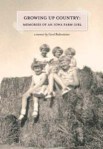 Go Away Home is her debut novel.
Go Away Home is her debut novel.
Links (Click below)
Go Away Home is available on Amazon in paperback and eBook.
Click here to read the first chapters now.
Growing Up Country: Memories of an Iowa Farm Girl is available on Amazon in paperback and eBook.


July 2, 2014
Author Wednesday – Courtney Giardina
 Welcome to Author Wednesday. Courtney Giardina stops by today to discuss her novel Tear Stained Beaches. The novel explores what happens when a marriage the ideal marriage suddenly isn’t. Courtney says that “Tear Stained Beaches, is the story of one woman’s strength to stand up for what she believes is best for her despite the thoughts and words of others. This novel gives women hope and courage to live the life they see fit for themselves.”
Welcome to Author Wednesday. Courtney Giardina stops by today to discuss her novel Tear Stained Beaches. The novel explores what happens when a marriage the ideal marriage suddenly isn’t. Courtney says that “Tear Stained Beaches, is the story of one woman’s strength to stand up for what she believes is best for her despite the thoughts and words of others. This novel gives women hope and courage to live the life they see fit for themselves.” 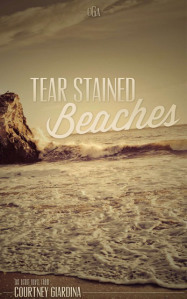
I’m so happy to welcome you today, Courtney. Your novel sounds fascinating. Let’s start with your writing life before we talk about your book. Do you have any writing rituals?
I always write at night. For some reason my creativity just doesn’t start flowing until 9pm or later. When that time comes I turn my music on to almost a whisper, open up my manuscript and begin to write.
That sounds like a very good ritual. Since I’m a writer myself, I’m always fascinated by other writers’ lives. What is your vision of yourself as a writer?
I love writing and always have. If I could continue to do so and keep gathering inspiration for many more books to come, I would be happy. I’ve met so many great authors and readers with just this one book, I’m excited to keep building relationships with people I wouldn’t have known otherwise. I’d also love to delve a little more into blogging as well to keep my writing up to speed.
I agree that the bonus of writing are the relationships formed with readers and writer. Tear Stained Beaches is your first novel, but you’re working on your second one. Are there common themes between the two books?
I’m just finishing up my second novel now–Holding on to Georgia. The official book trailer (click here to view) has been released and I’m gearing up for the cover reveal! I like to think that both of them have an overall message that readers can get out of it. It wouldn’t necessarily be the same for everyone, but I do want them to finish the book and be inspired by it. Carry it over to their everyday lives.
You’ve received a lot of reviews so far for Tear Stained Beaches, so what’s the best thing said about one of your books by a reviewer?
One of the greatest sentiments I’ve received from reviewers is how much they could feel the emotions of Haylie throughout the novel. The fact that my writing could really pull them in like that it such a sweet compliment.
I know how gratifying that is when you know a reader has really connected with something you’ve put on the page. We all receive them, so let’s talk about the bad review. What advice can you give to other writers about receiving one?
Learn from it, but don’t let it get you down. Not everyone is going to like your writing style or your story. You don’t write for them, you write because you love to write and your audience appreciates it.
Excellent advice, Courtney. I love the title of this book. How did you choose Tear Stained Beaches for the title? Has it been the title from the very beginning?
I wish I knew how it came to me! I really wanted something different, something that would catch a reader’s attention immediately and still convey the meaning of the book. Since most of my main character’s soul searching is on the beach, I began focusing on that and then Tear Stained Beaches just popped into my head.
You mentioned you have a similar theme in both your novels. What is the specific message you’ve conveyed?
The overall message in this book is to always be true to yourself. We all have the strength and courage to do what it best for us, sometimes it just takes a little digging to find it.
You are right about that. Thank you for writing a novel that also provides inspiration. Without giving us a spoiler, tell us a little bit about your favorite scene in this book.
This book is quite emotional, but there is one scene in the book that made me laugh out loud while I was writing it. It’s when Haylie first meets Chase. Let’s just say, she didn’t quite make the best impression, but it was a head banging one.
That’s a good teaser. Tell us about your life away from the keyboard. What do you do during your down time?
I love to workout and find new ways to challenge myself. I’ve taken up many fitness classes here in Charlotte such as Pure Barre, bootcamp and dance classes. Right now I am a member of a boxing club, and I love to sign up for 5k races. My next challenge is going to be a Wipeout inspired 5k called Roc Race. I’m very excited!
Not only do you write inspirational novels, but you’re an inspiration in your personal life. If a movie was made about your success as a writer, who would play you?
Ironically enough it would be the same person who I would pick to play Haylie if Tear Stained Beaches was a movie. That would be Sophia Bush. I really adore not only her acting skills, but who she is as a person.
Thank you for stopping by today, Courtney. It’s been a real pleasure to get to know you, and I look forward to reading Tear Stained Beaches. Please stop back when the new novel is finished.
 About Courtney Giardina: Courtney is a Rochester, New York, native who currently resides in Charlotte, North Carolina. After nine months of wearing out the delete button on the keyboard, Tear Stained Beaches was completed. She is currently working on her second novel. When she’s not writing, Courtney is an avid health and fitness lover who has currently taken up a love of boxing as a member of Title Boxing Club and loves trying out new healthy recipes from Pinterest.
About Courtney Giardina: Courtney is a Rochester, New York, native who currently resides in Charlotte, North Carolina. After nine months of wearing out the delete button on the keyboard, Tear Stained Beaches was completed. She is currently working on her second novel. When she’s not writing, Courtney is an avid health and fitness lover who has currently taken up a love of boxing as a member of Title Boxing Club and loves trying out new healthy recipes from Pinterest.
Click on links below to find Courtney and Tear Stained Beaches.


June 27, 2014
#Book Review Friday – Time to Let Go by Christoph Fischer
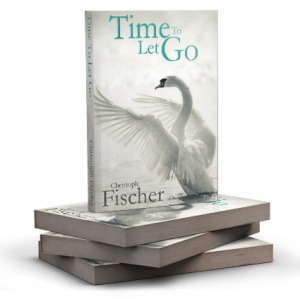
Click on cover
I’m used to being transported to another era when I read a novel by Christoph Fischer. Set in England, his latest offering, Time to Let Go, transports the reader, not through the years, but into the lives of one family dealing with the splintered effects of Alzheimers.
I’ve lost several relatives and friends to this devastating disease. I’m familiar with the stages for the patient and the ramifications on the care givers. And so is Christoph Fischer in his portrayal of Biddy Korhonen and her family members dealing with her descent into Alzheimers.
Mr. Fischer shows the various ways individuals deal with the illness. There’s the husband Walter who depends upon the routine and regimen of a scheduled life to keep his wife from falling into a deeper stage. He can keep control of the situation to a certain extent, only as far as Biddy’s mind will allow it. Nothing can bring her back to the loving wife she’d always been. When he can’t control his wife’s failings, he absorbs himself in creating a book of family memories. He can control what is remembered and how much is revealed about the individuals who make up the Finnish branch of the Korhonen family.
Daughter Hanna uses the mother’s illness as a chance to come home and hide out from the realities of her life as an airline stewardess when things go horribly wrong on her last flight. Her casual attitude toward schedules and regimens clashes with her father’s grip on his life with Biddy. Hanna runs into problems with this casualness, yet there are times when Biddy seems so happy with the change.
It’s all here in this novel, and it’s done in such a way that the reader is caught up in the lives of the Krohonen’s and rooting for the family to finally communicate with one another before it’s too late. I found myself agreeing with both sides in the debate on how to handle Biddy’s situation. Since I’ve seen the terrific toll Alzhemiers takes, I understand the complicated feelings and situations that arise. Mr. Fischer handles it deftly and with sympathy for both Hanna and Walter and Biddy. No one is right, and no one is wrong.
As he does with his historical novels set in the first half of the twentieth century in eastern Europe, Mr. Fischer manages to bring in the prejudices of a generation raised with biases toward people of different religions, races, and ideologies. It’s not an indictment of older generations, but it is a reality best met with honesty and acceptance.
Thank you, Christoph Fischer, for once again bringing us a work of fiction that asks us to examine our beliefs and open our minds to honest communication with those we love the most.
To purchase Time to Let Go, click on the cover below.
Disclosure: I was given an advance review copy in exchange for an honest review.


June 25, 2014
Interview with Annamaria Bazzi – Incantation Paradox
I’m very pleased to welcome back Annamaria Bazzi to Writing Whims. She’s come by today during her new release Book Tour for Incantation Paradox.
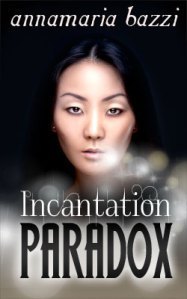
Cover Designer: Natasha Brown
About Incantation Paradox (Urban Fantasy) – A car accident cuts Dolores Reynard’s life short, leaving her with a long list of unfulfilled dreams. When she awakens in a strange bed, inside a much younger body, and living with a new family—she can’t worry she might be going insane. How can she be a teenager again?
Jason Richmond understands the danger awaiting his new houseguest. Wanting to ease her concerns, he works to earn Dolores’ trust. But attraction flares in the most unexpected way, and he finds himself caught between setting the situation right and following his heart.
An enduring evil threatens not only the blossoming love but their lives as well. As Dolores and Jason struggle to unravel the truth behind her resurrection, they find themselves tangled in a web of murder, intrigue and magic. Only together can they hope to overcome the incantation paradox holding them captive.
Welcome back, Annamaria. Congratulations on the publication of your new book. Tell us about your vision of yourself as a writer.
I’ve been writing since a teenager, but once I had children I began to write for the young, wanting to instill in them the love of reading. As my children grew so did my novels. I occasionally write adult fiction, but mostly I concentrate on young adult in the hopes of capturing all those teens, who like my youngest don’t like to read. If I can turn even just one teenager to reading, my vision will be fulfilled.
What’s next for you?
Now that I’m done with Incantation Paradox, I’m working on the edits for White Swans A Regency World, which is a young adult story that takes place in a world mimicking the Regency Era. I originally started publish it as a short story series, but the idea never took off. I have now completed the entire novel, which, by the way, will also be a series about both Kendíka and Jillian.
How did you choose the title Incantation Paradox? Has it been the title from the very beginning?
When I first started writing the novel, I called it Trapped in a Nightmare. Later I Googled the title to see if other books had same title. I did find one and decided I wanted my book to have a unique title. Since I’m quite bad at coming up with interesting titles I solicited other author friends and Michael Drakich came up with title—Incantation Paradox.
It’s a great title. Michael is a great creative mind. How long do you estimate it took you to take the book from an idea to a finished, published novel?
To write the book, it only took me about three to four weeks; I can’t really remember, it’s been a while. I wrote it in first person. Submitted chapter to Critiquecircle.com and completed a second draft with the help of the critters. I stashed the novel away to distance myself from it. When I started working on it again, I became intrigued with Eric’s character and decided to rewrite it in third person so I could get into this character’s head. It took me another month or more to rewrite it since I was also writing White Swans A Regency World at the time. For the past few months, it’s been going back and forth between my editor and me. The novel will be coming out in mid May.
Is the book traditionally or self-published? Why did you choose one over the other?
Incantation Paradox is self-published. With the big six playing it safe and only publishing works from successful authors, ones that are known to have large following, translating in money, I’ve felt that I’d never be counted among these lucky few. Therefore, I’ve spent a great deal of energy on my platform and social media. If I had decided to go with a small press, I would still have to do most of the marketing, hence I’d rather be self-published and manage the book the way I want to.
You are a tireless marketer and promoter for other Indie Authors. Good job (and thank you!) Who is the antagonist in your book? Did you enjoy creating this character?
Eric is the antagonist, and he isn’t what he seems. Don’t want to spoil things, so all I’ll say is, he is pure evil. I did enjoy creating him, but to be honest I think he is a character that snuck up on me when I wasn’t paying attention and diligently working on my own edits. The evil exuding from him was too much and I had to investigate further.
Without giving us a spoiler, tell us a little bit about your favorite scene in this book.
My favorite scene is when Dolores wakes up in the hospital and sees Dr. Richmond. He looks and sounds familiar, but she cannot place him. Did she really meet him? Does she really know him? The questions build so much stress that she won’t eat until she has the answers.
Thank you for including Writing Whims on your blog tour. I wish you the greatest of success on Incantation Paradox and all your other endeavors.
 About Annamaria Bazzi: Although born in the United States, Annamaria Bazzi spent a great deal of her childhood in Sicily, Italy, in a town called Sciacca. Italian was the language spoken at home. Therefore, she had no problems when she found herself growing up in a strange country. Upon returning to the states, she promised herself she would speak without an accent. She attended Wayne State University in Detroit Michigan, where she obtained her Bachelor of Science in Computers with a minor in Spanish.
About Annamaria Bazzi: Although born in the United States, Annamaria Bazzi spent a great deal of her childhood in Sicily, Italy, in a town called Sciacca. Italian was the language spoken at home. Therefore, she had no problems when she found herself growing up in a strange country. Upon returning to the states, she promised herself she would speak without an accent. She attended Wayne State University in Detroit Michigan, where she obtained her Bachelor of Science in Computers with a minor in Spanish.
Annamaria spent twenty years programming systems for large corporations, creating innovative solution, and addressing customer problems. During those years, she raised four daughters and one husband. Annamaria lives in Richmond Virginia with her small family where she now dedicates a good part of her day writing.
Connect with Annamaria Bazzi
Blog – http://annamariabazzi.com
Website – http://www.annamariasbooks.com
Facebook page – https://www.facebook.com/Author.annamariabazzi
Email – annamariascorner@yahoo.com
Twitter – https://twitter.com/AMBazzi
Goodreads – https://www.goodreads.com/author/show/6890526.Annamaria_Bazzi
LinkedIn – https://www.linkedin.com/profile/view?id=124386057&trk=nav_responsive_tab_profile
Kendíka’s Facebook page – https://www.facebook.com/kendika.burkeshire
Book Links:
Amazon - http://www.amazon.com/Annamaria-Bazzi/e/B00API579Q/ref=sr_tc_2_0?qid=1397056372&sr=1-2-ent
Smashwords – https://www.smashwords.com/profile/view/sobril
Barnes & Noble – http://www.barnesandnoble.com/s/annamaria-bazzi?store=allproducts&keyword=annamaria+bazzi


June 24, 2014
Author Wednesday – Janna Yeshanova
 Welcome to Author Wednesday. Today I welcome Janna Yeshanova, the author of romance stories set in Russia. Love is Never Past Tense, the first in the series, on the Black Sea where a couple meets and falls in love. A speedy courtship led to a quick marriage, then the world showed up. A divorce inspired by outside forces sent them on separate destinies, always wondering “what if…” Sounds intriguing, doesn’t it?
Welcome to Author Wednesday. Today I welcome Janna Yeshanova, the author of romance stories set in Russia. Love is Never Past Tense, the first in the series, on the Black Sea where a couple meets and falls in love. A speedy courtship led to a quick marriage, then the world showed up. A divorce inspired by outside forces sent them on separate destinies, always wondering “what if…” Sounds intriguing, doesn’t it? 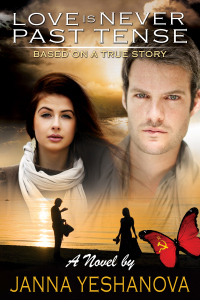
Welcome, Janna. I’ve been impressed by your biography and your stories, so tell me when did you first discover your voice as a writer?
Approximately twenty years ago when traveling with my husband and my daughter through North Carolina, we decided to stop at a fruit market. Suddenly, a strong smell of peaches brought back a memory of my childhood: my six year old friend and I are sitting on the grass and consuming a huge box of furry peaches one after another… Two carefree kids in a world of blue sky, lilac, sunshine and juicy peaches… I captured those memories on a piece of paper that I found in the car. Later, I edited the story, but it was lost when we were moving to a new house.
Somehow you made your way back to writing despite that loss. You’ll either recreate it or it wasn’t meant to be published. One of my heroes is Rachel Carson the author of Silent Spring. In one of her last interviews she said she never chose a subject because as a writer, the subject chose her. Describe a time when a subject chose you.
A scene from In The Land of Scarabs (the second book in this series), describes a problem with customs in Egypt.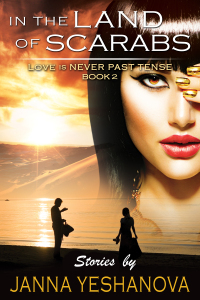 This actually happened to me in Bucharest, when I stepped in the Romanian airport several years ago. After being held in their basement office for two hours I had to call the American Embassy in order to leave safely. In this case the subject definitely chose me! Love Is Never Past Tense… is based on a true story. So, it seems that subject chose me as well.
This actually happened to me in Bucharest, when I stepped in the Romanian airport several years ago. After being held in their basement office for two hours I had to call the American Embassy in order to leave safely. In this case the subject definitely chose me! Love Is Never Past Tense… is based on a true story. So, it seems that subject chose me as well.
It does seem to happen that way–it’s the great thing about being a writer. We can always say something happened to give us an idea for a novel! What messages or themes do you try to convey to your readers?
I try to convey the message that my Mom left for me. Once we talked on the porch sitting in the chairs facing each other. I was sad. My mom looked at me and said: The most beautiful thing in life is life. I thought a minute, and then, asked: Mom, what if it becomes so ugly that you do not want it anymore? She looked at me attentively and replied: Janna, the most beautiful thing in life is life.
What a beautiful message. Sometimes we have to hear it several times before it hits us. Write a paragraph as if you were a reporter writing about you for a newspaper article on up and coming authors.
Janna Yeshanova’s life is a lens that looks back at recent history and forward to a happy future. When ethnic and political turmoil overwhelmed her homeland, as is currently happening in Crimea, she led her mother and daughter out of the collapsing Soviet Union to America, with $126 in her pocket and nobody at all in her address book. As a life coach, she reveals the value of optimism in creating the future you want. As an author, past and present meet and intertwine through her contemporary romance novel Love Is Never Past Tense…
If anyone can attest to the importance of remaining positive and moving forward it is you. You are doing your work as a life coach and spreading your message through fiction. That’s excellent, Janna. What’s are you writing now?
I am finishing up and launching a series of sequels to Love Is Never Past Tense. The first, In The Land Of Scarabs was released May 26. I rewarded myself with a trip to Israel on the same date! The next, Zebra Fish, has just been released. 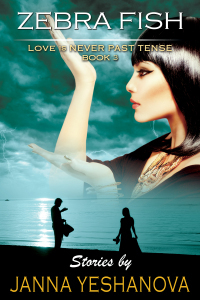
Congratulations on both books and your trip to Israel. I’m impressed that you reward yourself. We sometimes forget to do that. What knowledge have you acquired recently that might assist other writers?
1. Do not give up!
2. Do not share with anyone who may rain on your parade!
Excellent advice. I believe and follow both of these. You mentioned the message from your mother as finding its way into your fiction. Does this mean all your books have a common thread?
All my books involve the same main heroes. The first book, Love Is Never Past Tense, is based on a true story. The sequels are fictional, but based on the premise set in the first book. Because my name is in the books, I was debating how to deal with sex scenes: to cut them out or to keep. Couldn’t quite decide… Just to let you know, if I keep them, please know that all is fiction. If I do not, please know why.
OK, we’ve been forewarned. Great teaser! Why did you chose to write about love?
How can you not write about love that keeps the world alive?
How does setting play a role in your books?
Love Is Never Past Tense is set mostly in Ukraine. Odessa, Crimea, some other parts of my country… Half of this book was written in Crimea near my favorite Black Sea, under my favorite blue sky… Crimea is generously described in the book. In The Land Of Scarabs and in Zebra Fish are set in other locations where the story itself depends on the setting.
How is the current situation in Crimea and Odessa, Ukraine affecting you?
I was thinking about visiting there this past spring, but given the events that are happening there I can’t. If you are interested about my recent visit to Crimea, click here to read my blog article about it.
What’s the best thing said about one of your books by a reviewer?
Love Is Never Past Tense… was as much of a cultural experience for me as it was an enjoyable read. The novel did an excellent job of immersing me (an American reader) in Russian culture, through the eyes of a character experiencing extremely turbulent times for that region. It is a sensual love story set across contemporary Russian culture. It is inspiring as a reminder of passionate love beyond early youth.”
That’s very nice and especially gratifying that you brought another culture to the reviewer’s world experience. What’s your one sentence pitch for Love Is Never Past Tense…?
“This intriguing and often painful love story spans for decades of life-altering years, and life-altering events, but proves that true love will endure as long as the human heart beats.” I saw this on Amazon reviews. I agreed with it.
I love the title. How did you choose it? Has it been the title from the very beginning?
The title is representative of the underlying message of this story. The title came momentarily as soon as the book was finished.
Is the book traditionally or self-published? Why did you choose one over the other?
The book is self published. I wanted to publish it as fast as possible.
Who is the antagonist in the book?
Serge’s inner daemons are antagonists. His character is very colorful, smart, handsome, and controversial. Sometimes he is afraid to make decisions, and sometimes he gives in on his innermost values and then regrets it. You tell me what you think about him!
Without giving us a spoiler, tell us a little bit about your favorite scene in this book.
During their first three days together, Serge (as they called our hero at the time) was the quieter of the two, once in a while muttering some insignificant phrases. The first time he saw her, he silently followed her for a long time. She walked along easily, shifting her long, rather well-proportioned legs. Her thin leather skirt swung from side to side, barely hiding her shapely hips. A green blouse tightly covered her beautifully straight back. All the while, Serge followed her like she was a vision, lacking the courage to come closer or to back away. He knew that making her acquaintance was a long shot; she was simply out of his league. How could he possibly know that she, a complete stranger, would inexplicably impact his life and be with him forever, whether she was at his side or not?
What else do you want readers to know about your book?
Anyone who’s ever pondered the eternal question, “What makes life worth living?” can find the answer within the international romantic saga of Love Is Never Past Tense.
 About Janna Yeshanova: Originally from the former Soviet Union, Janna Yeshanova, M.A., M.Ed., escaped to the United States when persecution became violent during the crumbling of her country. Arriving in the United States with her mother and daughter in tow, $126 in her pocket and knowing not a soul, Janna’s talent, experiences and education have helped her become a high end organizational training and development professional. Her exodus story is included in the book.
About Janna Yeshanova: Originally from the former Soviet Union, Janna Yeshanova, M.A., M.Ed., escaped to the United States when persecution became violent during the crumbling of her country. Arriving in the United States with her mother and daughter in tow, $126 in her pocket and knowing not a soul, Janna’s talent, experiences and education have helped her become a high end organizational training and development professional. Her exodus story is included in the book.
Founder and principal of Life-Spark, LLC, Janna is a dynamic and powerful life coach, premier trainer and motivational speaker. She leverages her passion and engaging style to help others to overcome adversity and spark the possibilities of their lives.
Love Is Never Past Tense… was published first in Russia and Ukraine in 2009, and is now available in English. It is a fascinating adventurous romance based on a true story. The two fictional sequels In The Land Of Scarabs and Zebra Fish were published in 2014.
AUTHOR CONTACT LINK:
Website: http://www.loveisneverpasttense.com
Facebook: https://www.facebook.com/loveisneverpasttense
Twitter: @NeverPastTense
Goodreads:https://www.goodreads.com/book/show/22031165-love-is-never-past-tense
Newsletter : http://jannayeshanova.wordpress.com/join-the-list-for-a-free-ebook/
BUY LINKS
Amazon: http://amzn.to/1rSpHxv
Barnes & Noble: http://bit.ly/1i9DfUk
Kobo: http://store.kobobooks.com/en-US/ebook/love-is-never-past-tense-1
iTunes: https://itunes.apple.com/us/book/love-is-never-past-tense…/id754506839?mt=11
Smashwords: https://www.smashwords.com/books/view/372640


June 23, 2014
#Romance in A Month – I Did It

Romance in a Month
The month has ended for Romance in a Month, and while I didn’t finish my first romance, Behind the Altar, I’m close. The bones are in place. I will write the final chapters–the resolution–this week, and I’ll have a draft.
This project represents the first time I’ve participated in a month-long writing assignment, and it’s my first attempt at writing a romance. And I’m signed up to do another class for the sequel in September. It was a successful experience for several reasons.
I wrote something new every day. I’m in the editing stage for Native Lands, my next book in the Florida Fiction Series, so I’m working on old stuff instead of creating fresh. There’s something inspiring to the creative process to be working with a new story.

I didn’t have to worry about revising or publishing. I just wrote and became involved in the story of my main characters, Dean and Leah.
The plot for a romance is generally simpler than what I’m doing with my other novels, and that’s a good thing. I’ve always fought the “formula” novel, but now that I’ve written one, I find it freeing in its structure. I only have to worry about writing the story to fit.
Participating in a class meant I had cheerleaders at the end of every writing day. We all posted our updates–a sentence or two–about our progress and received lots of “Good job” comments. Now we’re all pairing off to be beta readers for one another, and that’s nice as well.
I’m glad I participated, and I’m ready to do it again. Of course, I’ve yet to print out the first draft of Behind the Altar. Maybe I won’t be as enthusiastic when I go back and read what I’ve written! I’ll keep you posted. In the meantime, the sequel Behind the Bar will be fermenting in my head. Stay tuned!


June 19, 2014
The “Human Heirs” of Marjorie Kinnan Rawlings
I found this post on my Living Lightly blog and thought I’d reblog here. I needed the reminder!
 Originally posted on Living Lightly:
Originally posted on Living Lightly:
[This essay received the First Place Award in the 2001 Marjorie Kinnan Rawlings Essay Contest. This award came one month after I left teaching to pursue writing full time. I saw it as a sign that I had made the right decision.]
My new world frightened me. I didn’t see the beauty of the live oak trees draped in moss or understand the lure of frogs singing on a summer night. The wildlife of northern Florida held threats to my safety and left me wondering why we had moved here from Michigan.
I saw danger lurking in the surrounding wilderness. One morning I looked in the mirror and saw a tick, fat with my blood, attached to the center of my forehead. The first time I saw a broadhead skink, I threatened to leave my new home and head back to a land of lizard-less…
View original 393 more words


June 18, 2014
Author Wednesday – Christoph Fischer
 Welcome to Author Wednesday. Today I welcome back Christoph Fischer for a guest post about his latest release A Time to Let Go. Christoph’s three other novels are set in Eastern Europe during the years of the Great Wars, and offer glimpses into what it was like for people of all gender, religion (or lack thereof), cultural heritage, and sexual preferences. The Three Nations Trilogy (The Luck of the Weissensteiners, Sebastian, and Black Eagle Inn) provide an excellent overview of life before, during, and after war.
Welcome to Author Wednesday. Today I welcome back Christoph Fischer for a guest post about his latest release A Time to Let Go. Christoph’s three other novels are set in Eastern Europe during the years of the Great Wars, and offer glimpses into what it was like for people of all gender, religion (or lack thereof), cultural heritage, and sexual preferences. The Three Nations Trilogy (The Luck of the Weissensteiners, Sebastian, and Black Eagle Inn) provide an excellent overview of life before, during, and after war.
However, his latest book A Time to Let Go takes a different path. Set in contemporary times in England, the book explores the life of one family as they deal with the onset of Alzheimers of Biddy, the mother and wife of the Korhonen family. In this guest post, Christoph writes about how and why this story was written. Please watch for my review of Time to Let Go on Book Review Friday.

Click on cover
How Time to Let Go Came to Be
by Christoph Fischer
The Real Biddy Korhonen
I grew up with only a few friends and with two older siblings who were miles ahead of me in their lives. My mother was a busy woman, and so I spent a lot of time at my aunt’s house. She had always wanted to raise four children but lost one child at birth. Her other three children were much older and didn’t need her much anymore, so my visits to her house filled a gap for her, in the same way, her attention to me filled a need in me. A match made in heaven.
Philomena, or Minna, as we called her, remained a source of happiness and encouragement throughout my life. I was always welcomed and treated like a precious gift. She smoked, but she outlived both of her sisters who were taken in their forties by cancer.
In her late seventies, Minna was diagnosed with Alzheimers disease. At least she was alive, I thought, belittling her misfortune without much awareness.
The next time I saw her, her trademark happiness seemed far away. She was crying bitterly because she had lost her hearing aid, a very expensive one, too. Suddenly her life seemed to revolve around retrieving things. She was spared the physical pain of her sisters, but she suffered severe mental torture.
She fortunately reached a happier stage as medication and care helped reduce the misery in her life, but the attention she needed was a huge toll to the family. Despite her memory loss, she seemed to vaguely recognize me; me, the “child” who lived abroad and who rarely came to visit. She had not lost her warmth and happiness, or maybe she had just regained it after the bad patch in the early stages.
Very recently, I saw her again, almost unrecognizable: withdrawn, very unresponsive, and almost reduced to basic functioning. Surprisingly, she could still read, and when I came to see her for a second time her eyes shone as if she did recognize me. I made an emotional goodbye to her, and her hand was shaking as she listened to my speech. She even responded by talking, using words that didn’t fit exactly, but which expressed an emotion similar to what one would expect from a loving aunt in such a situation.
With her loving kindness in mind, I created Biddy, the mother in Time to Let Go, a selfless, giving woman, who even in her illness manages to show her innate kindness. I know it would be wrong to praise her for a gift that many other patients do not have, through no fault of their own. Losing one’s memory and control of one’s life is a terrible thing that you can only understand when it happens to you.
Time to Let Go is a tribute to my brave aunt and to the wonderful people who help make her life dignified and as happy as is possible.
Alzheimers
My book is inspired by personal experiences with sufferers from the disease. Nowadays, almost everyone knows someone who has relatives with Alzheimers and gradually stories and anecdotes about these patients have entered the social dinner party circuit and become common knowledge.
Alzheimers is a dreadful disease that cannot be easily understood in its gravity and the complex, frustrating, and far-reaching consequences for the victims and their families. There are different stages of the disease as it progresses and patients can move through them at different paces and in varying intensity. My book does not attempt to be a complete representation or a manual of how to deal with the disease. The illness affects every patient differently, and there are many stories to tell and many aspects to cover. I hope that I can bring some of those issues to the surface and help make the gravity of the disease more prominent. However, I decided to stay firmly in fiction and family drama territory, and not to write a dramatized documentary on the subject.
I have witnessed several different approaches to handling the disease by both individuals and entire families, and I have learned that the people involved in every case need to work out what is best for them. In my book, a family works out their particular approach, which is right for them. They have different ideas about it and need to battle it out. These clashes fascinated me, and I felt they were worth exploring.
Issues of caring at home, mobile-care assistance, or institutionalizing patients are personal and, depending on where in the world you are, every family has very different options or limitations. The ending in my book must be seen in that context: as an individual “best” solution that uniquely fits the Korhonen family.
As point of first reference and for a more comprehensive and scientific overview of information and help available, I recommend: http://www.alzheimers.org.uk/ in the UK, and http://www.alz.org/ in the United States.
There are support groups, help lines, and many other sources available in most countries, which will be able to advise specifically for each individual situation.
I can also recommend Because We Care by Fran Lewis. This fantastic book has a comprehensive appendix with more or less everything you need to know about the disease: Its stages, personal advice on caring, information, tools and help available in the United States.
For consistency, I exclusively used material relating to a medium-advanced stage of the disease. To protect the privacy and dignity of the patients that inspired the story, I have altered all of the events and used both first- and second-hand experiences and anecdotes. Nothing in this book has actually happened in that way. Apart from some outer parallels between my characters and patients I witnessed, any similarities with real people, alive or dead, are coincidental and unintended.
Airlines
The airline plot is not based on any real incident but is inspired by my own imagination. I used to work for an airline, and so naturally, much of Hanna’s life is based on my own experience of fifteen years flying. I lived with the awareness that every time a call bell goes off on a plane this could be a matter of life and death. What happens to Hanna in the book has never happened to me or anyone close to me. My flying life was not that extraordinary. Fortunately.
But every year airline crew are retrained in emergency procedures and aviation medicine, and at least during those intense yearly re-training sessions your mind cannot help considering the possibilities of such events.
The modern trend of the “suing- and compensation-culture” and the extent of it in some cases worries me a little, which is why some of that concern found its way into the book.
The lifestyle of cabin crew and pilots is often falsely glorified as a glamorous string of free holidays and leisure. A recent crew strike in the UK has brought the profession into disrepute in the media, representing them as fat cats and lazy bones. My book aims to shed a bit of light on the realities of flying. I enjoyed the life and would not want to miss the experience, but it is a tough life that demands huge personal sacrifices and flexibility, sleep deprivation on a massive scale, and exposure to aggressive and abusive behaviour by a consumerist clientele. In the global trend of cost cutting, salaries are going down and what used to be a career is at risk of becoming a minimum-wage job handed to people who have no experience and who have no incentive to give it their all.
My book is a tribute to my former colleagues in the airline industry personnel, who, in my opinion, are unsung heroes and a bunch of wonderful, hard-working and very caring people.
Memory
What makes Alzheimers’ so terrible? What is it that makes a memory so important to one’s life that people compare its horrors to pain-inflicting diseases such as cancer? You are alive and physically well, you eat and function as a human, but as an Alzheimer patient, you are bound to be suffering, frustrated, depressed and unhappy.
Of course, it is ridiculous to compare the two diseases, but while a cancer patient still has their awareness and choices, the Alzheimer sufferer is losing the core of their being, and everything they ever were.
How can you define yourself if you cannot remember? You have had children, but you won’t recognize them. You won awards, had a successful career, made people happy, but you don’t know any of it. Who are you and what are you doing on the planet? Who are the people around you? As the disease progresses, these things become more intense and you can live in a mental prison of fear and disorientation. Your brain won’t do as you want it to. The fear of losing it altogether, for some is impossible to bear. You are about to lose everything that was ever precious to you.
That thought is frightening to all of us. It can happen to all of us. The worst stage seems to be when patients still notice that something is wrong. We all know how annoying it is when we just put something down and don’t remember where. Imagine that happening to you all the time, every day, and you get an idea of how it might feel. The caretakers see their loved ones slowly drift away into a stranger.
Biddy’s husband Walter in my novel becomes obsessed with preserving memories—his own and others. He begins to write a family chronicle as a constructive outlet for his fears. He is an important character with his musings about preserving knowledge, memories, and facts, and he allowed me to bring in thoughts about the disease on a different and more reflective level.
I hope that I have managed to write about more than just the clinical side of the disease. I stuck to the early stages of Alzheimers in the story because it gave me the best opportunities to work these thoughts into the story. It allows me to look back at Biddy’s past but with still a lot of hope.
 About Christoph: Christoph Fischer was born in Germany as the son of a Sudeten-German father and a Bavarian mother. Not a full local in the eyes and ears of his peers he developed an ambiguous sense of belonging and home in Bavaria. He moved to Hamburg in pursuit of his studies and to lead a life of literary indulgence. After a few years he moved on to the UK where he is still resident today.
About Christoph: Christoph Fischer was born in Germany as the son of a Sudeten-German father and a Bavarian mother. Not a full local in the eyes and ears of his peers he developed an ambiguous sense of belonging and home in Bavaria. He moved to Hamburg in pursuit of his studies and to lead a life of literary indulgence. After a few years he moved on to the UK where he is still resident today.
Links – United States (click on title for Amazon page):
The Luck of the Weissensteiners
Links – UK (click on title for Amazon page):
The Luck of the Weissensteiners



